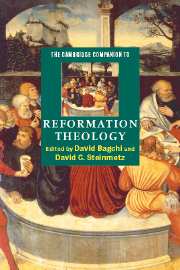Book contents
- Frontmatter
- Introduction
- 1 Late medieval theology
- 2 Lollardy
- 3 Hussite theology and the law of God
- 4 The theology of Erasmus
- 5 Luther
- 6 Melanchthon
- 7 Confessional Lutheran theology
- 8 The theology of Zwingli
- 9 Bucer
- 10 The theology of John Calvin
- 11 John Calvin and later Calvinism
- 12 The theology of Thomas Cranmer
- 13 The theology of the English reformers
- 14 The Scottish Reformation
- 15 An introduction to Anabaptist theology
- 16 Catholic theologians of the Reformation period before Trent
- 17 The Council of Trent
- Conclusion
- Select bibliography
- Index
- Series list
1 - Late medieval theology
Published online by Cambridge University Press: 28 May 2006
- Frontmatter
- Introduction
- 1 Late medieval theology
- 2 Lollardy
- 3 Hussite theology and the law of God
- 4 The theology of Erasmus
- 5 Luther
- 6 Melanchthon
- 7 Confessional Lutheran theology
- 8 The theology of Zwingli
- 9 Bucer
- 10 The theology of John Calvin
- 11 John Calvin and later Calvinism
- 12 The theology of Thomas Cranmer
- 13 The theology of the English reformers
- 14 The Scottish Reformation
- 15 An introduction to Anabaptist theology
- 16 Catholic theologians of the Reformation period before Trent
- 17 The Council of Trent
- Conclusion
- Select bibliography
- Index
- Series list
Summary
If there is one thing that can be called a genuine breakthrough in the last half-century of Reformation studies, it would be the 'discovery' that the Reformation had a background. The reformers, all of whom were theologians, and a good number of whom had formal academic training in the discipline, emerged out of a theological landscape that profoundly shaped their horizons. Some elements from this late medieval theological bequest they rejected; some they appropriated; and still others they sublated by taking something old and fashioning from it something new. In other words, their ideas did not spring to life ex nihilo, or descend from above, or emerge full-blown from an 'objective' study of the Bible alone. They worked in the intellectual context of late medieval theology, and consequently, without some grasp of this context, there can be no adequate understanding of their theology. By today, this realization has had an impact on every area of Reformation studies.
One of the most prominent features of this landscape was its pluralism. The major theme of sermons preached at the papal court on the eve of the Reformation was that ‘Peace now reigns in Christian doctrine’. The research of the last half-century has made it increasingly apparent that nothing was further from the truth. The achievement of a pax theologica, proclaimed for whatever reason by these hand-picked sacred orators, was a chimera. The reality was that theological faculties at virtually all universities in Europe, from the venerable older institutions of Paris and Oxford to the newer German ones,were deeply divided into factions or ‘schools’ that differed not only on specifics but often also on fundamental approaches to the discipline.
- Type
- Chapter
- Information
- The Cambridge Companion to Reformation Theology , pp. 5 - 14Publisher: Cambridge University PressPrint publication year: 2004
- 4
- Cited by



